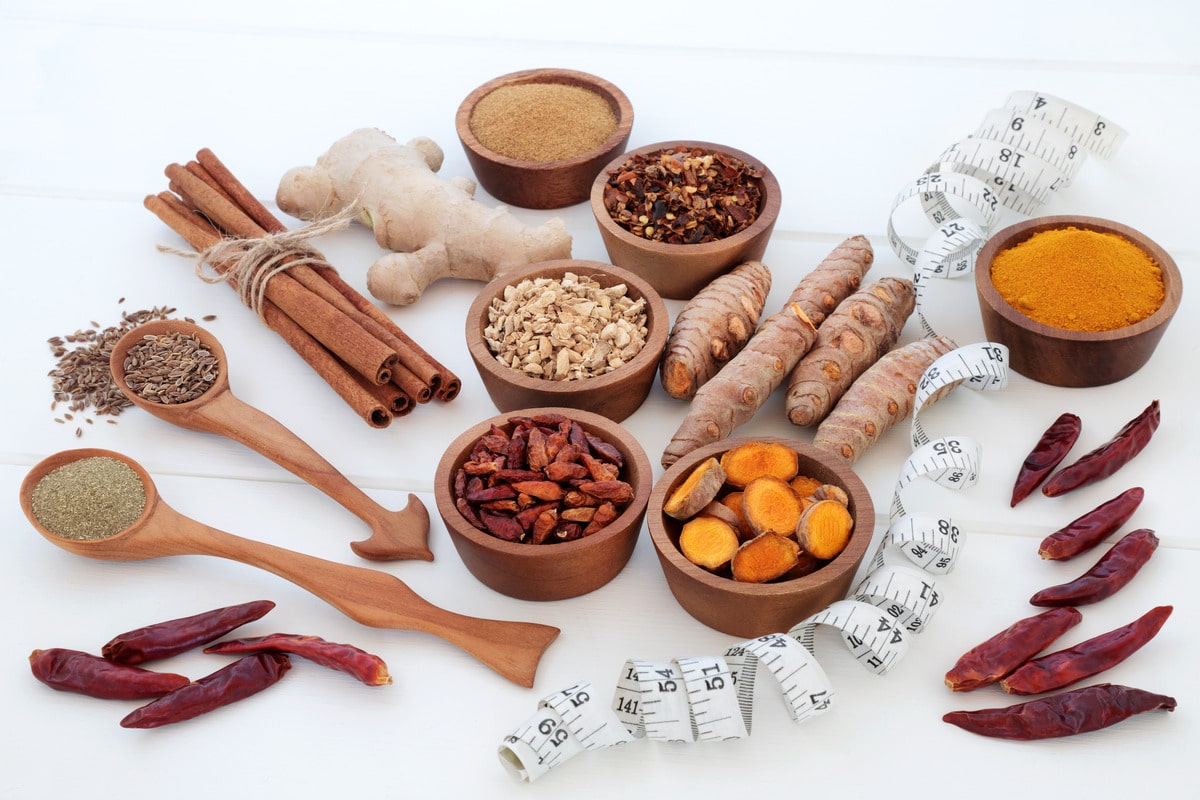Herbs For Weight Loss: 12 Natural Boosters For Fat Loss

When it comes to losing weight, the spotlight usually falls on calorie tracking, meal plans, and workouts. But often, the smaller players, like those ingredients sitting quietly on your kitchen shelf, go unnoticed. Herbs, for instance, may not seem like weight-loss warriors, but many of them can subtly and effectively support your journey.
Surprisingly, specific natural herbs for weight loss can influence appetite, improve digestion, and enhance metabolism. While they are not miracle cures, they can undoubtedly amplify the results of a balanced lifestyle when used consistently and correctly.
This article explores 12 scientifically-backed herbs that help you lose weight. You will discover their functions, how they work in the body, and the practical ways you can use them in your everyday meals or routines. If you have ever wondered whether any spice is good for burning fat, this guide has the answers.
12 Natural Herbs for Weight Loss
Let us explore the best herbs for weight loss. Each selection is supported by scientific findings, showing how it may help reduce fat absorption, curb cravings, and boost metabolism.
1. Turmeric
Turmeric is best known for its active compound, curcumin. Beyond its anti-inflammatory properties, research shows that curcumin supports fat loss by enhancing thermogenesis. It is the process by which the body generates heat and burns calories.
In one clinical study, overweight participants who took curcumin supplements twice daily for 30 days saw a reduction in belly fat and lost up to 5% of their body weight. Curcumin helps reduce adipogenesis, the formation of new fat cells, and increases fat breakdown. Turmeric can also help regulate insulin and blood sugar levels. That makes it useful for those with insulin resistance or metabolic syndrome.
You can sprinkle turmeric into soups, curries, or smoothies. For better absorption, combine it with a pinch of black pepper and a healthy fat like olive oil.
2. Fenugreek
Fenugreek is one of the most effective herbs for weight loss. Rich in soluble fiber, it helps slow digestion, promote satiety, and reduce appetite. This means that it can keep you full for longer and ensure that your calorie consumption is kept in check.
One study found that consuming 8 grams of fenugreek fiber daily reduced hunger and decreased fat intake by 17%. This natural herb has also shown promise in regulating blood glucose levels, which may curb sugar cravings. It is no secret that cravings are a common barrier to weight loss.
Fenugreek can be consumed as soaked seeds, as a powder in herbal teas, or added to Indian-style lentil dishes and flatbreads.
3. Cinnamon
Among the most widely used herbs good for weight loss, cinnamon plays a significant role in stabilizing blood sugar levels and improving insulin sensitivity.
Its primary bioactive compound, cinnamaldehyde, may enhance thermogenesis and reduce appetite. Cinnamon may slow the breakdown of carbohydrates in the digestive tract, which will help avoid sugar spikes and energy crashes.
A daily dose of half a teaspoon in oatmeal, coffee, or Greek yogurt can make a flavorful and functional addition to your diet.
4. Cayenne Pepper
Cayenne pepper contains capsaicin, a compound known to raise metabolic rate and reduce hunger. Capsaicin stimulates the body’s fat-burning processes by increasing energy expenditure and enhancing lipid oxidation.
In one study, individuals who consumed capsaicin burned 50 more calories per day and experienced fewer hunger pangs. Capsaicin also reduces levels of ghrelin, the hunger hormone, while increasing satiety.
Use cayenne to spice up soups, roasted veggies, scrambled eggs, or even salad dressings.
5. Cumin
Cumin is not just a kitchen staple; it is one of the most potent weight-reducing herbs. Studies show that it helps accelerate metabolism, improve digestion, and enhance fat breakdown.
In one trial, women who added 3 grams of cumin to yogurt twice daily for three months lost significantly more weight than the control group. Cumin’s thermogenic properties and its ability to enhance bile secretion can improve fat digestion and nutrient absorption.
You can add it to lentils, beans, and stir-fried vegetables or use it as a dry rub for chicken or tofu.
6. Ginger
Ginger has long been used in herbal medicine to manage nausea and improve digestion. However, not many know that it also plays a key role in fat-burning remedies.
Clinical studies indicate that ginger boosts metabolism, reduces fat absorption, and increases satiety. It may also suppress inflammation and oxidative stress, which are often elevated in people with obesity.
Ginger tea, fresh ginger in stir-fry, or grated ginger in smoothies are all simple ways to incorporate this herb into your weight loss strategy.
7. Caralluma Fimbriata
Caralluma Fimbriata is often used in natural weight-loss supplements. It can suppress appetite by increasing serotonin levels. As a result, this herb reduces the desire to overeat and keeps calorie intake in control.
In a 12-week clinical trial, participants who took Caralluma extract experienced more significant reductions in waist circumference and hunger levels compared to a placebo group.
Caralluma is usually consumed in capsule form and should be taken under the guidance of a healthcare provider.
8. Green Coffee Bean Extract
Green coffee beans are simply unroasted coffee beans that contain chlorogenic acid. This compound can help reduce fat accumulation and improve glucose metabolism.
A review of three studies revealed that green coffee extract helped participants lose an average of 5.5 pounds more than those on a placebo. It may also reduce abdominal fat by limiting fat absorption in the gut.
Green coffee bean extract is commonly available as a supplement. One should consume it in moderation and preferably under expert guidance.
9. Black Pepper
Black pepper contains piperine, which enhances the absorption of other nutrients (like curcumin) and disrupts the formation of new fat cells.
Studies show that piperine supplementation can lead to reduced body weight, even without changes in food intake. In some cases, it can also block the genes responsible for new fat cell formation.
Sprinkle black pepper generously on eggs, salads, and soups. It works best when paired with other spices like turmeric or cumin.
10. Gymnema Sylvestre
Gymnema is widely used in Ayurvedic medicine for its ability to regulate blood sugar levels. The herb contains gymnemic acid, which temporarily suppresses the taste of sweetness and reduces sugar cravings.
Studies have shown that individuals taking Gymnema consume fewer calories and report a reduced desire for sweets. It may also improve insulin function and reduce fat storage in the liver.
Gymnema is available as a tea or in capsule form. It is best used as a short-term appetite suppressant.
11. Ginseng
Ginseng, particularly Korean or American ginseng, has shown promise in promoting weight loss through its ability to alter fat metabolism.
In a study, overweight participants who consumed ginseng twice a day for eight weeks experienced weight loss and improved gut microbiota diversity. The herb appears to influence adipogenesis and fat absorption in the intestine.
Ginseng can be consumed in teas and soups or as a standardized extract. Start with low doses and increase gradually as tolerated.
12. Oregano
Oregano is rich in carvacrol, a compound that may help block the genes involved in fat synthesis. Studies show that carvacrol supplementation reduces body weight and visceral fat accumulation.
While human studies are still limited, oregano’s antioxidant and anti-inflammatory properties support metabolic health, making it useful in a weight-conscious diet.
Use dried oregano liberally in sauces, marinades, and salad dressings for both flavor and function.
Excellent Herbal Remedies for Fat Absorption
Even with a balanced diet, managing fat absorption can contribute to sustainable weight loss. Here are five herbal remedies that support fat metabolism and help prevent fat storage.
1. Ginger-Cinnamon Tea
Ginger increases thermogenesis and reduces appetite. Cinnamon stabilizes blood sugar and prevents cravings. Together, they improve digestion and prevent fat accumulation.
Preparation
Boil 1 cup of water with 1 tsp of fresh grated ginger and ½ tsp of cinnamon. Let it steep for 10 minutes.
2. Fenugreek Water
This simple remedy slows down digestion and enhances satiety. It also supports insulin sensitivity, making it useful for fat loss and sugar control.
Preparation
Soak 1 tbsp of fenugreek seeds overnight. In the morning, strain and drink on an empty stomach.
3. Green Coffee Bean Smoothie
The chlorogenic acid in green coffee reduces fat absorption. When combined with fiber-rich greens and healthy carbs, it promotes fullness and curbs mid-morning snacking.
Preparation
Blend 1 scoop of green coffee extract with almond milk, spinach, and 1 banana.
4. Turmeric-Pepper Detox Drink
Curcumin boosts metabolism and blocks fat production. Piperine from black pepper enhances its absorption. Lemon adds vitamin C and digestive benefits.
Preparation
Mix 1 tsp turmeric, a pinch of black pepper, and the juice of ½ lemon in warm water.
5. Ginseng Herbal Broth
Ginseng may suppress appetite and promote fat oxidation. As part of a light dinner or pre-lunch soup, it can enhance satiety and minimize caloric intake.
Preparation
Simmer 1 tsp dried ginseng root with vegetable broth and herbs.
How to Use Herbs Safely for Weight Loss
Herbs can offer metabolic support and appetite control, but one must use them safely to prevent side effects or complications. Here are four key points to remember.
1. Start Small and Observe
Introduce one herb at a time in small doses. Starting slow allows your body to adjust and gives you time to track any reactions, sensitivities, or digestive changes. For example, begin with a pinch of turmeric or a few soaked fenugreek seeds.
2. Follow Recommended Dosages
Whether you are consuming herbs in food or supplement form, stick to the suggested dose. For instance, no more than 1 tablespoon (about 14 grams) of powdered herbs per day. One must take supplements according to label instructions unless your doctor advises otherwise.
3. Avoid Interactions with Medication
If you are taking medication for diabetes, high blood pressure, or any chronic condition, consult your healthcare provider before adding herbs. Some herbs, like Gymnema or ginseng, can lower blood sugar levels and may interact with medications.
4. Choose Reputable Sources
Not all herbal supplements are created equal. Always purchase from trusted brands that provide third-party lab testing and transparent ingredient lists. Avoid products with artificial fillers, unverified health claims, or excessive combinations of multiple herbs in one capsule.
HealthifyMe Note
When people think about weight loss, their mind often races to cardio machines, protein-packed meals, and calorie counters. But what if we paused and paid attention to the little things we overlook? For example, the herbs simmering in our soups or the seeds steeping in our tea? As a nutrition expert at HealthifyMe, I often remind my clients that fat loss is not only about restriction; it is also about smart inclusion. Natural herbs to lose weight offer subtle, sustainable support when woven into a balanced lifestyle. They do not work alone, nor do they promise miracles. But they help in quiet, powerful ways. The real key lies in understanding your body and identifying which herbs help with your digestion, metabolism, or cravings. With personalized plans and careful strategizing, even a sprinkle of the right herb can tip the balance in your favor. Weight loss is a reflection of how well you listen to your body. And sometimes, your spice rack can be a great help.
The Final Word
There is no single herb that will melt the pounds away, and no tea that will cancel out a high-sugar diet. But when used consistently and wisely, herbs can complement your efforts and support you from the inside out. From turmeric’s anti-inflammatory boost to fenugreek’s ability to tame your appetite, each herb has a role in helping you move closer to your goals.
What makes these weight loss herbs so powerful is not just their chemical properties; it is their place in a broader lifestyle built on mindful eating, informed decisions, and long-term consistency. The best herbs for weight loss are those you can effortlessly incorporate into your daily meals and routines without depending on extremes or quick fixes.
Every individual deserves a plan that honors their preferences, pace, and priorities. That is why the Healthify Smart Plan, powered by AI Coach Ria, takes the guesswork out of eating. Whether you are looking for fat-burning remedies, personalized weight-loss herb recipes, or ways to balance your meals naturally, this AI-backed platform helps you choose ingredients that suit your body’s needs. With this information, maybe you will start seeing your spice cabinet a little differently.
Frequently Asked Questions (FAQs)
Q: Do herbs actually help with weight loss?
A: Yes, certain herbs can support weight loss when paired with a balanced diet and exercise. Herbs like turmeric, fenugreek, and cayenne pepper may influence metabolism, appetite, and fat absorption. However, they are not standalone solutions. They work best as part of a comprehensive lifestyle strategy.
Q: Which is the most effective herb for fat burning?
A: Turmeric is one of the most studied herbs for fat loss due to its active compound, curcumin. It may promote thermogenesis and reduce fat storage. Other herbs for fat loss, like cayenne pepper and cumin, also show positive effects on metabolism and appetite suppression.
Q: How can I include herbs in my daily diet for weight loss?
A: Start by using herbs in cooking. For example, you can add ginger to stir-fries, cinnamon to oatmeal, and turmeric to soups. You can also brew them as herbal teas or take them in capsule form if needed. The key is consistency and moderation.
Q: Are there any side effects to using herbs for weight loss?
A: Most herbs are safe when consumed in culinary amounts. However, taking high doses or combining multiple herbal supplements can lead to side effects. Always consult a healthcare provider if you are on medications, pregnant, or managing chronic health conditions.
Q: Can herbs replace diet or exercise in a weight loss plan?
A: No. Herbs good for weight loss act as supportive tools but cannot replace calorie control, nutrient-rich meals, or physical activity. They work best when used alongside a structured, sustainable health routine.
Q: What are some proven herbal remedies for fat absorption?
A: Some proven herbal remedies for fat absorption include turmeric with black pepper, fenugreek water, ginger tea with cinnamon, and green coffee bean smoothies. These help regulate metabolism and may reduce the formation or absorption of fat cells.
Q: Are there herbs for extreme weight loss?
A: Some natural herbs like Caralluma fimbriata and green coffee extract have been linked to greater fat reduction, but “extreme” results depend on multiple factors. Herbs may amplify results, but should not be used for rapid weight loss without medical supervision.
Q: What is the difference between fat-burning spices and weight-reducing herbs?
A: Spices like cayenne or black pepper primarily increase thermogenesis, while weight-reducing herbs like gymnema or fenugreek work on appetite and glucose regulation. Both can help with weight management, but through different mechanisms.
Research Sources
3. Curcumin inhibits adipogenesis in 3T3-L1 adipocytes and angiogenesis and obesity in C57/BL mice
4. Fenugreek and Its Effects on Muscle Performance: A Systematic Review
9. Capsaicin for Weight Control: “Exercise in a Pill” (or Just Another Fad)?
10. The effects of hedonically acceptable red pepper doses on thermogenesis and appetite
11. Effect of cumin powder on body composition and lipid profile in overweight and obese women
16. Serotonin controls feeding and satiety
21. Effect of piperine in the regulation of obesity-induced dyslipidemia in high-fat diet rats
23. A systematic review of Gymnema sylvestre in obesity and diabetes management
24. Effects of sweetness perception and caloric value of a preload on short-term intake
25. Influence of Panax ginseng on obesity and gut microbiota in obese middle-aged Korean women
26. Effects of Korean white ginseng extracts on obesity in high-fat diet-induced obese mice




